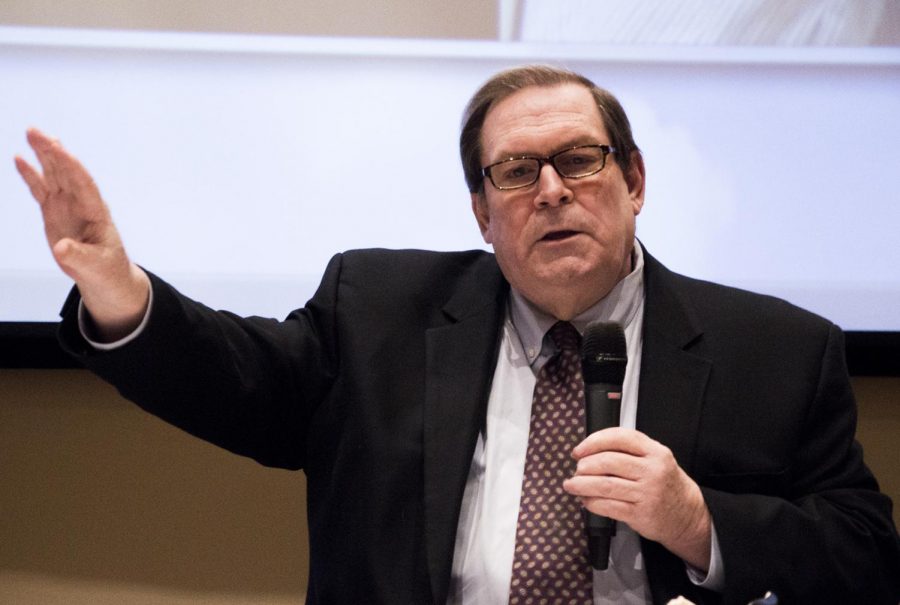Public forum explores lasting impact of the Civil War
February 7, 2018
From the controversy regarding symbols that represent the Confederacy, including statues and the Confederate flag, to political and social inequality for black people that continued after the Civil War, the Civil War continues to be a topic of discussion today.
On Tuesday at 6:30 p.m., the history department hosted a public forum called “Uncivil: Race, Memory and the Civil War” in the Jody Richards Hall auditorium. Historians Thea Browder, John Hardin, Glenn LaFantasie and Selena Sanderfer presented their opinions and findings about the controversy and current issues regarding the Civil War. After they presented, they allowed the audience to ask questions and participate in discussion.
Morganfield senior Audrey Wheatley said she believes the Civil War is a relevant topic today because of its ties to race. Wheatley, a history major, was an audience member at the forum.
“I think race is still very prevalent today, and I still think that there’s a barrier between whites and blacks, and I think obviously it’s nowhere near like it was in the Civil War,” Wheatley said. “But just with all the different race issues going on today, I think that still points to how the Civil War is still relevant, because the base issue was slavery.”
Louisville junior David Merdian, an audience member at the forum, said he believes slavery began the social and political oppression against blacks in the United States.
“The social control of blacks has taken numerous forms over the years, but it started with slavery, and I am fundamentally of the opinion that everyone ought to have an equal chance at making it in life,” he said. “They don’t all have to make it, but they should at least all be given an equal chance to.”
Several activists see the fact that Confederate monuments still stand and that Confederate flags still wave as a symbol of lasting racial hatred and a romanticization of the Confederacy.
During her presentation, Browder mentioned Bree Newsome. According to the Washington Post, Newsome was a black woman who climbed up a flag pole in Columbia, South Carolina, to remove a Confederate flag June 27, 2015, after a white man massacred what Newsome referred to as a “black church” in Charleston, South Carolina, and killed nine people June 17, 2015. Newsome said she took down the flag because she believed it represented “hatred” and “oppression” against blacks.
On Aug. 12, 2017, white nationalists and counterprotesters gathered in Charlottesville, Virginia at the removal of a Confederate statue of Robert E. Lee. The protesting turned violent and resulted in the death of a 32-year-old woman, according to the New York Times. The event represented the controversy surrounding the Confederate monuments and the white nationalism that still exists in the United States.
In Hardin’s presentation, he discussed his personal experience with segregation as a black man growing up in Louisville in the 1950s. He said that today he sees a “second wave” of people saying that members of the Confederacy were the victims of the Civil War and reconstruction rather than blacks.
“What we’re seeing today – I’ve been through it once before, growing up,” he said.
Hardin said one of the purposes of the forum was to review the topic of the Civil War and put it into a current context.
“What we as historians have to do is to break down that interesting wall between myth about the Civil War and the reality, [which] is based on documents,” he said. “It’s based on evidence, understanding how the evidence and the myth sometimes challenge each other.”
Several people in the United States also may misunderstand or may not be fully educated about slavery, or they may avoid discussing the topic.
According to NPR, a report from the Southern Poverty Law Center found that in schools, teachers sometimes feel uncomfortable covering the topic of slavery, students get defensive about the topic of racism and textbooks and teachers often focus on figures like Harriet Tubman or Frederick Douglass instead of giving the full context and painful realities of slavery. According to NPR, the report also found that only a third of 1,000 high school seniors “correctly identified the law that officially ended slavery, the 13th Amendment, and fewer than half knew of the Middle Passage.”
Hardin said he believes statues and other symbols of the Confederacy are not “glorious” and that the Confederacy should not be romanticized. During his presentation, he said people who try to defend the symbols see themselves as the last defenders of white nationalism.
“Today, people are saying ‘well, why are we getting rid of this? This is glorious,’” he said. “No, it isn’t.”
Features editor Olivia Mohr can be reached at 270-745-6291 and [email protected]. Follow her on Twitter @oliviamohr3.





















![Megan Inman of Tennessee cries after embracing Drag performer and transgender advocate Jasmine St. James at the 9th Annual WKU Housing and Residence Life Drag Show at Knicely Conference Center on April 4, 2024. “[The community] was so warm and welcoming when I came out, if it wasn’t for the queens I wouldn’t be here,” Inman said.](https://wkuherald.com/wp-content/uploads/2024/04/smith_von_drag_3-600x419.jpg)


